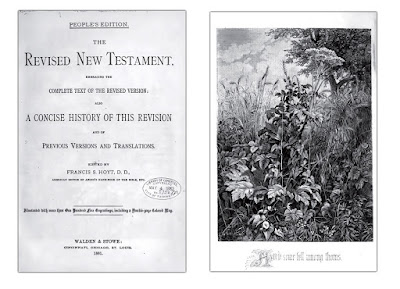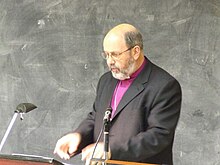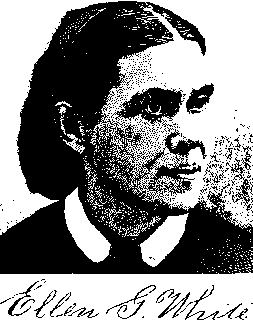Buy at Barnes and Noble - Buy at Amazon - Buy on Ebay
Thursday, January 18, 2024
Michael Behe (and Evolution) on This Day in History
Saturday, January 13, 2024
Goodspeed: The Greatest Bible Translator on This Day in History
This day in history: Edgar J. Goodspeed died on this day in 1962. Goodspeed was an American theologian and scholar of Greek and the New Testament, and Ernest DeWitt Burton Distinguished Service Professor of the University of Chicago until his retirement. He taught for many years at the University of Chicago, whose collection of New Testament manuscripts he enriched by his searches. The University's collection is now named in his honor.
He earned a B.A. from Denison University in Granville, Ohio 1890, and he then studied Semitics at Yale for one year under William Rainey Harper. A little later, Harper was appointed as the first president of the University of Chicago, and Goodspeed moved to Chicago and continued his graduate studies at this new institution, where Goodspeed's father was one of the founders and secretary of the Board of Trustees. He was a post-graduate fellow at the University of Chicago from 1892, and he received his Doctor of Biblical Studies degree in 1897.
Goodspeed received his Ph.D. in 1898 at The University of Chicago. He spent the following two years abroad, traveling and studying in Germany, England, the Netherlands, Egypt, Palestine, and Greece.
Later, in 1928, Goodspeed later he also received a doctorate in Divinity from the Denison University (Doctor honoris causa).
With such learning under his belt, The book "So Many Versions" stated in regards to Bible translation: "No man in America was better equipped by background by background and training for such a task."
His New Testament was published in 1923 and can be downloaded for free at archive.org.
Professor Jason Beduhn declared that Goodspeed was one of the three greats in Bible Translation history (the other two being James Moffatt and Brooke Foss Westcott).
Here are some samples of his translation:
Professor Jason Beduhn declared that Goodspeed was one of the three greats in Bible Translation history (the other two being James Moffatt and Brooke Foss Westcott).
John 1:1 "In the beginning the Word existed. The Word was with God, and the Word was divine."
Mat 5:3 "Blessed are those who feel their spiritual need, for the Kingdom of Heaven belongs to them!"
John 10:38 "But if I am doing them, then even if you will not believe me, believe the things I do, in order that you may realize and learn that the Father is in union with me, and I am in union with the Father."
Heb 1:6-8 "But of the time when he is to bring his firstborn Son back to the world he says, "And let all God's angels bow before him." In speaking of the angels he says, "He who changes his angels into winds, And his attendants into blazing fire!" But of the Son he says, "God is your throne forever and ever! And a righteous scepter is the scepter of his kingdom!"
John 14:17 "It is the Spirit of Truth. The world cannot obtain that Spirit, because it does not see it or recognize it; you recognize it because it stays with you and is within you."
John 8:57, 58 "The Jews said to him, 'You are not fifty years old, and have you seen Abraham?' Jesus said to them, 'I tell you, I existed before Abraham was born!'"
Acts 19:4 "John's baptism was a baptism in token of repentance."
Col 2:9 "For it is in him that all the fulness of God's nature lives embodied, and in union with him you too are filled with it."
Php 2:5,6 "Have the same attitude that Christ Jesus had. Though he possessed the nature of God, he did not grasp at equality with God."
Rev 5:9, 10 "Then they sang a new song: 'You deserve to take the roll and open its seals, for you have been slaughtered, and with your blood have bought for God men from every tribe, tongue, people, and nation, and have made them a kingdom of priests for our God, and they are to reign over the earth.'"
2Tim 3:16, 17 "All Scripture is divinely inspired, and useful in teaching, in reproof, in correcting faults, and in training in uprightness, so that the man of God will be adequate, and equipped for any good work."
1 Cor 13:4-13 "Love is patient and kind. Love is not envious or boastful. It does not put on airs. It is not rude. It does not insist on its rights. It does not become angry. It is not resentful. It is not happy over injustice, it is only happy with truth. It will bear anything, believe anything, hope for anything, endure anything. Love will never die out. If there is inspired preaching, it will pass away. If there is ecstatic speaking, it will cease. If there is knowledge, it will pass away. For our knowledge is imperfect and our preaching is imperfect. But when perfection comes, what is imperfect will pass away. When I was a child, I talked like a child, I thought like a child, I reasoned like a child. When I became a man, I put aside my childish ways. For now we are looking at a dim reflection in a mirror, but then we shall see face to face. Now my knowledge is imperfect, but then I shall know as fully as God knows me. So faith, hope, and love endure. These are the great three, and the greatest of them is love."
About 70 years ago, E.C. Colwell created an apparatus to determine the best New Testament, in his book "What Is The Best New Testament" [University of Chicage Press, 1951.] Colwell chose 64 Scriptures in the Gospel of John where there were slight differences between the weaker (later) Greek Text (Textus Receptus) and the better Greek Text based on older manuscripts. For instance, at John 5:2, the weaker texts have "Bethasda" while the texts based on older manuscripts have "Bethzatha." Colwell wanted to determine which Bible was the most faithful to the best Greek text. His conclusion was that Goodspeed's New Testament was the best New Testament, as it translated all 64 verses correctly. I then tested other Bible Versions that came out since then, and I discovered 2 other Bibles that did as well as Goodspeed's: The New World Translation, and the 21st Century New Testament (Vivial Capel). The New International Version only scored 51 out of 64, and the English Standard Version only got 52 out of 64 correct. Rotherham's Emphasized Bible and Byington's Bible in Living English were quite accurate as well.
Goodspeed was so respected in his time that he was invited to help translate the Revised Standard Version.
Smith & Goodspeed's An American Translation is no longer in print, but a search on Ebay will usually help you find a copy.
Friday, December 1, 2023
Bible Scholar N.T. Wright on This Day in History
Saturday, November 18, 2023
Meatless Fridays on This Day in History














.jpg/225px-Living_Bible_(cropped).jpg)
